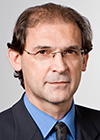Plenary Speaker

Printing Technologies for Sensor Applications
Paolo Lugli
Free University of Bozen-Bolzano
Abstract: The paper presents a variety of sensors realized using printing techniques, which offer the advantage low costs and environmental friendliness with respect to conventional fabrication routes. The active part of the sensors is based on nanomaterials such carbon nanotubes or metallic nanostructures, which are dispersed in a solvent to form an ink which in turn can be easily printed. Such sensors can find application in environmental monitoring, in agriculture, in IoT systems and in healthcare applications.
Biography: Paolo Lugli graduated in Physics at the University of Modena, Italy, in 1979. In 1981 he joined Colorado State University, Fort Collins, CO, where he received his Master of Science in 1982 and his Ph.D. in 1985, both in Electrical Engineering. From 1988 to 1993 he was Associate Professor of “Solid State Physics” at the “Engineering Faculty” of the 2nd University of Rome “Tor Vergata”. In 1993 he was appointed as Full Professor of “Optoelectronics” at the same University. In 2002 he joined the Technical University of Munich where he was appointed head of the newly created Institute for Nanoelectronics. From 2015 to 2016 he was Dean of the Department of Electrical and Computer Engineering at TUM. In January 2017 he became Rector of the Free University of Bozen-Bolzano in Bolzano, Italy. His current research interests involve printed electronics, nanoimprint lithography, the modeling, fabrication and characterization of organic devices for electronics and optoelectronics applications, the design of circuits and architectures for nanostructures and nanodevices, the numerical simulation of microwave semiconductor devices, and the theoretical study of transport processes in nanostructures. He is author of more than 450 scientific papers and co-author of the books "The Monte Carlo Modelling for Semiconductor Device Simulations" (Springer, 1989) and “High Speed Optical Communications“ (Kluver Academic, 1999). He served as General Chairman of the IEEE International Conference on Nanotechnology held in Munich in 2004 and as Program Chair of the same conference held in Rome in 2015. He is IEEE Fellow and member of the German National Academy of Science and Engineering (ACATECH).